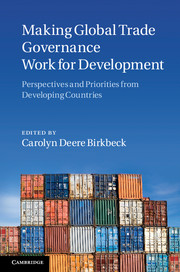 Making Global Trade Governance Work for Development
Making Global Trade Governance Work for Development Book contents
- Frontmatter
- Contents
- Figures
- Tables and boxes
- Contributors
- Acknowledgements
- Introduction
- Part I Global trade governance
- 1 Globalization, development and democracy
- 2 Trade, development and the UN Millennium Development Goals
- 3 The interactions of trade, macroeconomic policies and sustainability
- 4 Trade governance and sustainable development
- Part II Roles and responsibilities in global trade governance: diversity in developing country priorities and strategies
- Part III Strengthening multilateralism
- Part IV Making WTO negotiations and decision-making processes fairer
- Part V Conclusion
- Index
- References
2 - Trade, development and the UN Millennium Development Goals
the United Nations in the governance of world trade
from Part I - Global trade governance
Published online by Cambridge University Press: 07 September 2011
- Frontmatter
- Contents
- Figures
- Tables and boxes
- Contributors
- Acknowledgements
- Introduction
- Part I Global trade governance
- 1 Globalization, development and democracy
- 2 Trade, development and the UN Millennium Development Goals
- 3 The interactions of trade, macroeconomic policies and sustainability
- 4 Trade governance and sustainable development
- Part II Roles and responsibilities in global trade governance: diversity in developing country priorities and strategies
- Part III Strengthening multilateralism
- Part IV Making WTO negotiations and decision-making processes fairer
- Part V Conclusion
- Index
- References
Summary
We, the People of the United Nations … are determined to promote social progress and better standards of life in larger freedoms … [and] to employ international machinery for the promotion of the economic and social advancement of all peoples.
Charter of the United Nations, 1945Ministers affirm that the establishment of the World Trade Organization ushers in a new era of global economic cooperation, reflecting the widespread desire to operate in a fairer and more open multilateral trading system for the benefit and welfare of their peoples.
Marrakesh Declaration of 15 April 1994, establishing the WTOOne of the greatest challenges, and opportunities, facing the international community today is how to remould global trade governance to ensure greater coherence between the systems for international trade, financial, monetary and technology governance so that they support development and, specifically, to advance the achievement of the United Nations’ Millennium Development Goals (MDGs). A critical part of this challenge is how to more overtly foster global solidarity and integrate development principles and equity considerations into how the global economy is governed. This chapter emphasizes the dual importance of the global trading system as a global public good that can help all nations solve trade-related problems through a coordinated multilateral response, and also as a ‘global development good’, which facilitates economic, social and environmentally sustainable development for all.
This chapter traces the evolution of the United Nations’ (UN’s) development ideas, initiatives and goals as related to trade, including the MDGs. It demonstrates how the UN, through its research, analysis and strategic monitoring as well as the advocacy and support for developing country causes, policy-makers and negotiators, has contributed to remould the global trade governance system towards a greater focus on development. It recognizes that despite the best efforts of the UN Secretariat and Member States, progress has been limited, however, and that there are new and emerging issues, or ‘game changers’, to reckon with. It reaffirms the need for a strong UN role and partnership with the World Trade Organization (WTO), as well as other existing and emerging economic governance systems, if development goals and principles of sustainable development are to be realized and to harness the new game changers as a positive force for development.
- Type
- Chapter
- Information
- Making Global Trade Governance Work for DevelopmentPerspectives and Priorities from Developing Countries, pp. 48 - 75Publisher: Cambridge University PressPrint publication year: 2011
